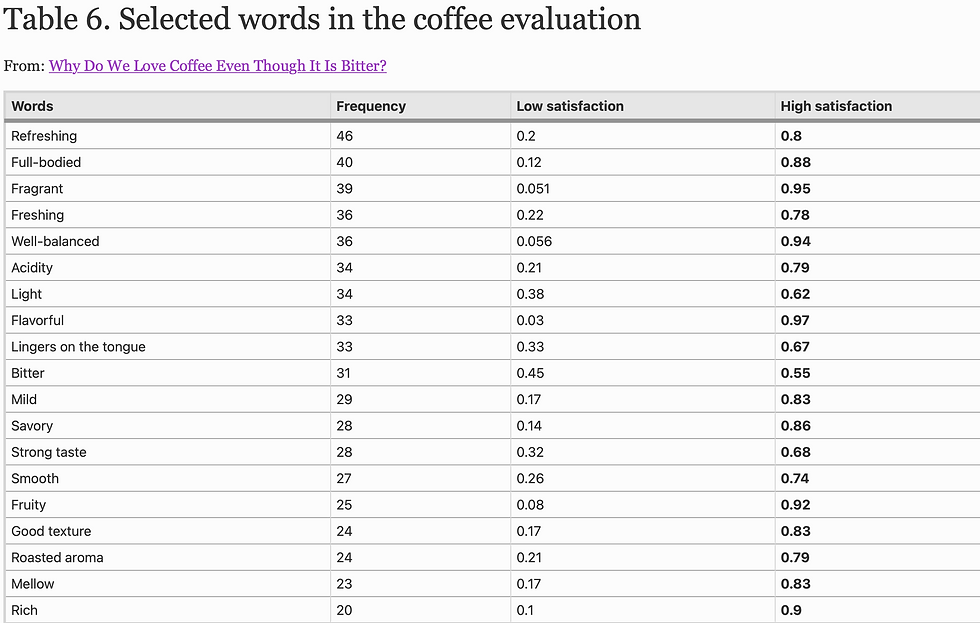Umami in coffee - a fallacy?
- Jowita
- Jun 8, 2023
- 3 min read
It is 6 AM, you just woke up. You get out of bed, shower and while brushing your teeth, you start craving some finger licking good bacon. Your mouth starts salivating on the memory of the salty taste that is super rich in flavour.
You finish brushing your teeth and go brew some coffee to get your day started. You take a couple of sips and notice your craving for bacon suddenly is gone. You know that you don't get hungry until mid day so it can't be hunger, it must be something else. What could it be?
The answer will blow you away and you might already know - it is umami. Umami is the thing or sense of taste that makes your mouth salivate when thinking of bacon and many other delicious foods.
But as we are coffee lovers, we went down the rabbit hole to find out if coffee has umami in it. Why? Because a lot of people think coffee has a umami taste to it. And we can't blame them.
The main hypothesis we are figuring out is if coffee can be a source of umami in foods, or in other words, if it does have umami in it. We looked at 6 studies to find out and we have an answer. So let's get to the bottom of all this and find out if coffee is umami or not. Tag along!

Firstly, what is umami?
The taste was discovered by a Japanese scientist named Kikunae Ikeda in the early 20th century. Umami is often referred to as the fifth taste sensation, alongside sweet, sour, salty, and bitter. It is a savory, rich, and deeply satisfying taste that tantalizes our taste buds. Think of steak, oyster sauce & bacon. It is mostly attributed to 3 chemical ingredients: Glutamate, 5´-inosinate and 5´-guanylate. If those are present in food, you can expect to never be disappointed by taste.
Does coffee contain umami? Yes!
In one of the studies, which set to figure out why we love coffee even if it is bitter, 36 participants were given to taste 98 different types of coffee and they clustered them together by type to get the flavour profile of coffee, of which 35 different words to describe coffee was given. In the image below, you can see four examples of the flavour profiles and you guessed it - all show the presence of the word umami.
People say they experience a great deal of umami when drinking coffee, which makes the drinking experience more enjoyable for them. The people participating also used high taste terms like aroma, flavour, sweetness to describe great coffee, not the level of bitterness.

So, does this mean that we can rest the case and go back to loving our warm cup of coffee and use it as a rub for seasoning steak? Not so fast, we still have some more evidence to show you, and it is not good.
How much umami is umami enough?
An article written on perfect daily grind talks about umami flavours in coffee and Dr. Fabiana Carvalho explains that the presence of umami is more an illusion put on by our brain, as coffee has low umami levels as it turns out. "Regarding the perception of umami flavours, we’re talking about flavour notes. That may probably be how we taste umami in coffee," Dr. Carvalho explains. And no coffee literature mentions umami or salt sensations in coffee (find the book that talks about it here - Espresso Coffee)
We may not taste the umami in coffee, but we smell it. Dr Carvalho further explains in the article that our noses can pick up umami molecules and sweetness. That is true, if you have ever eaten sweet food with your nose blocked, you might have found that the food does not taste that good.
So no substituting coffee for bacon?
Bringing it all together, there is umami in coffee, but it is so small that we can't really taste it, and might not even want to, as umami is attributed with meaty flavours.
But for sure we can smell it, maybe that is why dogs go crazy after smelling coffee. So, the next time you savour that steamy cup of coffee, take a moment to appreciate the aroma or other coffee profiles dancing on your taste buds. And don't be afraid to try coffee with umami rich foods, you are bound to be taken to fairyland. Cheers to the captivating world of no umami in coffee!



Comments